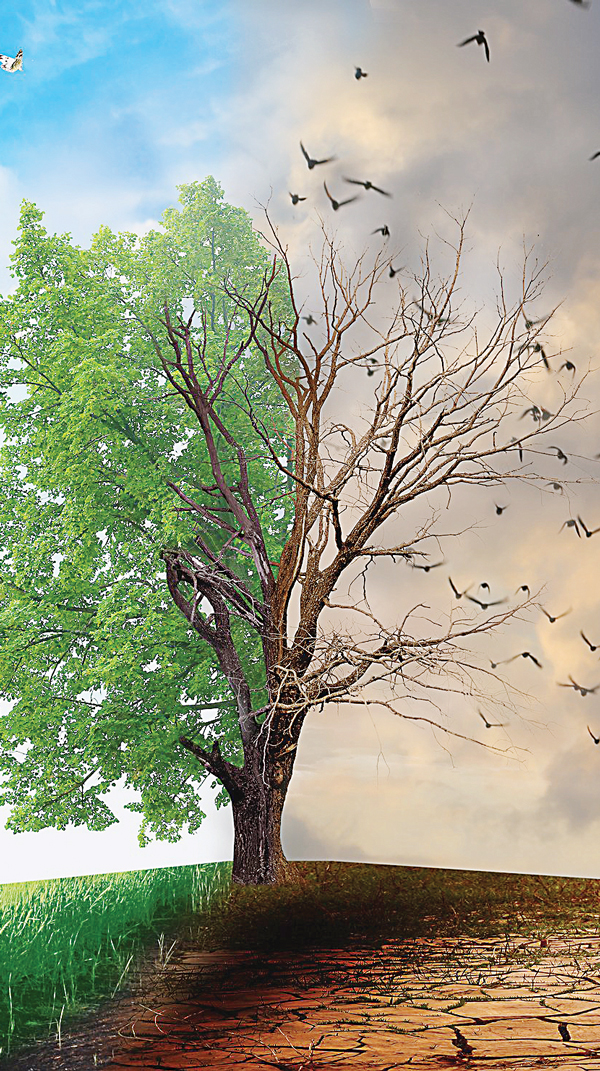Just last week, the air in Dhaka was filled with excitement, anxiety, and hope, as we approached the Dhaka North and South City Corporation Elections 2015 that were held on April 28. As residents of Dhaka city, we are all extremely invested in and concerned about the direction that this megacity will take in the near future.
Similarly, the environment in New York at the UN is also full of suspense since this is the year when all of our futures, at least for the next 15 years will be decided. That’s right — 2015 is the deadline for achieving the Millennium Development Goals and the adoption of a new development framework comprised of the Sustainable Development Goals.
Climate change is at the heart of these negotiations since it plays a crucial role in sustainable development. Research has shown that Bangladesh’s geographical location, geomorphic conditions, and demographic status has made it one of the most vulnerable to climate change. According to a survey conducted by MapleCroft that looks at 42 indicators across 170 countries, Bangladesh is on the top of among 16 countries that are most vulnerable to climate change in the next 30 years.
A number of important negotiations and meetings are lined up for 2015. The World Conference on disaster risk reduction was held in Sendai, Japan in March to discuss and strategise on how to reduce the risk of disasters.
The outcome of this meeting was that 187 UN member states adopted a new framework, the Sendai Framework for disaster risk reduction, 2015-2030 with seven targets and four priorities for action which include reductions in global disaster mortality, the number of affected people, economic losses in relation to GDP, damage to critical infrastructure, and disruptions in basic services among others.
The Green Climate Fund board meeting was also held in March in Songdo, Korea. The GCF was founded as a mechanism to redistribute money from the developed to the developing world, in order to assist the developing countries in adaptation and mitigation practices to counter climate change. This meeting was a crucial step towards the goal of operationalising the fund and taking decisions on program and project proposals by October 2015.
The GCF accredited seven entities for them to begin developing and submitting project proposals for consideration. The GCF also adopted decisions on a number of strategies and action plans which include analysis of the expected role and impact of the GCF, and interim gender policy and action plan among others.
In July, the Financing for Development meeting will be held in Addis Ababa to discuss and strategise on how to raise more money for projects that would speed development. This meeting is very timely and crucial given that the post-2015 framework will be adopted this year and hence financing of this framework is a key issue.
The Post-2015 Summit will be held at the UN headquarters in New York this September. The goal of this summit is the adoption the sustainable development framework. A total of 17 goals with 169 targets (as of now) are expected to replace the eight MDGs. The negotiations are expected to conclude and the outcome document to be finalised in July. It is important to note goal 13 which is: “Take urgent action to combat climate change and its impacts.” Acknowledging that, the UNFCCC is the primary international, intergovernmental forum for negotiating the global response to climate change.
The final conference, COP21 will be held in Paris in December, when governments hope to sign a global treaty on tackling climate change.
Surrounding the climate change negotiations, one contentious issue between developed countries and least developed countries is the Common But Differentiated Responsibilities (CBDR) principle of international environmental law establishing that all states are responsible for addressing global environmental destruction yet not equally responsible due to differences in states’ contributions to, as well as their abilities to address, these problems.
This originated in Principle 7 of the 1992 Rio Declaration and also appears in the UNFCCC, Principles, Article 3. However, actual implementation remains weak and/or absent. Small island developing states and LDCs including Bangladesh are concerned that developed countries plan to evade responsibility (financial and other) since they would like to replace CBDR with “applicable to all” in the climate negotiations, and “universally applicable” in the post-2015 negotiations.
As citizens of Bangladesh, it is important to know and/or follow the different negotiations and ensure that our priorities are reflected so that we can become more resilient to climate change. An important message moving forward is that there is an overarching need for strong commitment, political will, and comprehensive means of implementation.
Source: Dhaka Tribune










